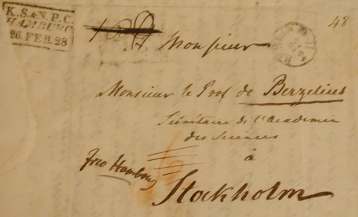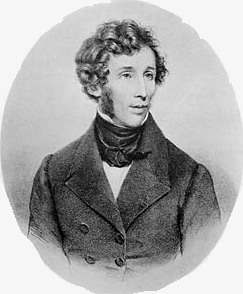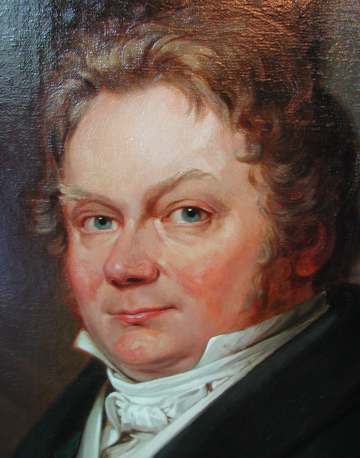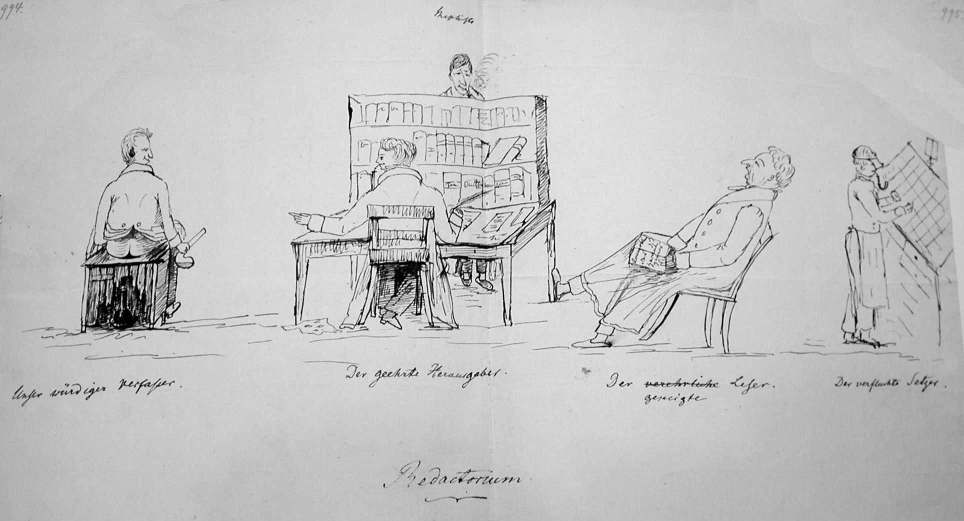|
Wöhler to Berzelius
(1828)
cf. Wöhler's paper
on urea
|

|
|
Berlin 22nd February
1828
Dear Professor,
While I certainly hope that
my letter of 12 January and the postscript of 2 February
have arrived, and I live daily, or better hourly, in the
eager hope of receiving your reply, still I will not wait
for it but rather write already again, because I cannot, so
to say, hold my chemical water and must tell you that
I can
make urea without the help of a kidney or even an animal,
neither man nor dog. Ammonium cyanate is
urea. - Perhaps you
still remember the experiment I carried out in that
fortunate time when I was working with you, in which I found
that whenever one tries to react cyanic acid with ammonia a
crystalline substance appears which is inert, behaving
neither like cyanate nor like ammonia. On leafing through my
notebook this struck me again, and I supposed it possible
that in combining cyanic acid with ammonia
the
elements might have come together in a different way, albeit
in the same proportion,
and thus perhaps a vegetable base or something of the sort
might have been formed. Thus I recently performed a small
experiment, appropriate to the limited time I have
available, which I quickly completed and
which,
thank God, did not require a single
analysis. - I obtained
the supposed ammonium cyanate very easily by treating lead
cyanate with caustic ammonia. One can also prepare it with
silver
cyanate and ammonium chloride.
I obtained it in quantity beautifully crystallized and
indeed in clear right-angled four-sided prisms. With acids
no carbonic acid or cyanic acid was formed and with base no
trace of ammonia. But with nitric acid there was formed a
compound that crystallized readily in glittering leaves with
a very acidic character that I was already inclined to
regard as a new acid, since upon heating no saltpeter or
nitric acid, but only a good deal of ammonia was formed -,
when I discovered that upon saturation with bases nitrate
salts and the original so called ammonium cyanate formed
again, and could be recovered from alcohol...

|

Friedrich Wöhler
|
Berzelius's
Reply
(the humor may be lame, but the last sentence from the
founder of dualism is telling)
Stockholm 7 March 1828
When one has begun his
immortality with urine, there is every reason to end the
trip to paradise in the same way. - and truly the doctor has
found the proper path to achieve immortal fame. Aluminum and
artificial urea, certainly two very different matters,
following one another so closely, will, my Lord, be braided
as jewels into your crown of laurels, and should the
quantity of the artificial not suffice, one could easily
make up the difference with a little from the chamber pot.
Will one now succeed in moving into somewhat broader
production (seminal vesicles being somewhat to the fore of
the bladder), what masterful art to make such a tiny child
in the laboratory of the technical school. - Who knows? It
might be easy enough. - But now enough raillery, especially
since I am in such a hurry to write discreetly in the
Annual Report. It is a truly important and beautiful
discovery that the doctor has made, and it gives me
indescribable delight to hear of it.
It is a
unique situation that the salt nature so entirely disappears
when the acid and ammonia combine, one that will certainly
be most enlightening for future
theory...
Please greet the friends for
me.
Greetings and
friendship
Berzelius
|

Berzelius portrait from Royal Swedish
Academy of Sciences
|
Wöhler loved joking, especially
with his old teacher Berzelius, who tended to appreciate jokes better
than Liebig or Dumas did.
An example is the cartoon he drew
showing Berzelius in the editorial office ("Redactorium") of his
Annual Reports on the Progress of Chemistry, which he produced
from 1821 until his death in 1848, and which made him the period's
ultimate chemical authority. I am not sure which letter this cartoon
accompanied, but it could easily relate to the exchange above, which
mentions both the Annual Report and possible sources of
urea.
The characters in this tableau are
labeled (r. to l.): the accursed typesetter, the
inclined reader ("respected" was
altered to "inclined" to pun on the fact that "inclined reader" is
the German way of saying the same thing as "gentle reader" in
English), the honored
editor (Berzelius), and our worthy contributor
(Wöhler?). Behind the desk in a wreath of smoke stands
Mephistopheles (Göthe's Devil), presumably to advise
Berzelius.

Many thanks to Anne Wiktorsson and the staff of the Center for
History of Science at the Royal Swedish Academy of Sciences for kind
hospitality and for providing access to these documents.
text copyright 2003 J. M. McBride



